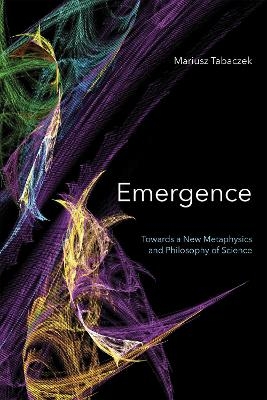
Emergence
University of Notre Dame Press (Verlag)
978-0-268-10497-9 (ISBN)
Over the last several decades, the theories of emergence and downward causation have become arguably the most popular conceptual tools in scientific and philosophical attempts to explain the nature and character of global organization observed in various biological phenomena, from individual cell organization to ecological systems. The theory of emergence acknowledges the reality of layered strata or levels of systems, which are consequences of the appearance of an interacting range of novel qualities.
A closer analysis of emergentism, however, reveals a number of philosophical problems facing this theory. In Emergence, Mariusz Tabaczek offers a thorough analysis of these problems and a constructive proposal of a new metaphysical foundation for both the classic downward causation-based and the new dynamical depth accounts of emergence theory, developed by Terrence Deacon. Tabaczek suggests ways in which both theoretical models of emergentism can be grounded in the classical and the new (dispositionalist) versions of Aristotelianism. This book will have an eager audience in metaphysicians working both in the analytic and the Thomistic traditions, as well as philosophers of science and biology interested in emergence theory and causation.
Mariusz Tabaczek, O.P., is a friar preacher, professor of theology, and member of the Thomistic Institute at the Pontifical University of Saint Thomas Aquinas in Rome. He is the author of Divine Action and Emergence: An Alternative to Panentheism (University of Notre Dame Press, 2021).
Table of Contents
List of Figures
List of Tables
Preface
Acknowledgements
Abbreviations
Introduction: Causation in Philosophy and Scientific Explanation
Causation and the Origins of Ancient Philosophy 1.1. Early Milesians 1.2. The School of Pythagoras and Plato
Aristotle and the Fourfold Notion of Causation 2.1. Material and Formal Causes 2.2. Efficient and Final Causes 2.3. Interrelatedness of Causes 2.4. Chance and Necessity
Causality in the Middle Ages
Causal Reductionism of the Modern Era 4.1. Causation and Modern Science 4.2. Causation and Modern Philosophy 4.3. Decline of Causal Explanation
Non-Reductionism and Emergentism
Emergentism and the New Mechanical Philosophy 6.1. Organization of Mechanisms 6.2. From Methodology to Metaphysics 6.3. Causal Mechanisms 6.4. Mechanisms and Downward Causation 6.5. Summary
Metaphysical Aspects of Emergentism
Emergentism and Dispositionalism
Plan of the Project Part 1. Metaphysical Aspects of Emergence and Downward Causation
The Central Dogma of Emergentism
Historical Facets
Characteristics of Emergence 2.1. Nonadditivity of Causes 2.2. Novelty of Complex Processes, Entities, and Properties 2.3. Ontology of Levels 2.4. Emergent Laws 2.5. Nondeducibility, Nonpredictability and Irreducibility of Emergents 2.6. Emergence and Downward Causation
Summary
Metaphysical Challenges for Emergence and Downward Causation
Insufficiency of the Negative Definition of Emergence
Ontological Status of Emergents
Problems of Nonreductionist Physicalism
Metaphysics of Downward Causation 4.1. What is the Cause in Downward Causation? 4.2. What is Being Acted Upon in Downward Causation? 4.3. What Is the Nature of Downward Causation
Kim’s Argument from Circularity and Causal Exclusion
A Response to Kim
Emergence and Downward Causation Redefined 7.1. Beyond Efficient Cause 7.2. Aristotelianism and Emergentism 7.3. In Search of Proper Metaphysics
Dynamical Depth and Causal Non-reductionism
Teleology Matters in Life Theories
Dynamical Depth – A True Face of Emergence? 2.1. Homeodynamics 2.2. Morphodynamics 2.3. Teleodynamics 2.4. Autogenesis
Causal Non-reductionism of Deacon’s Project 3.1. Material Cause 3.2. Formal and Efficient Causality 3.3. Teleology 3.4. Absences as Causes 3.5. Substances versus Processes 3.6. How Aristotelian is Deacon?
Incompleteness of Deacon’s Model of Emergence Part 2. Dispositions/Powers Metaphysics and Emergence
Theories of Causation in Analytic Metaphysics
Regularity View of Causation (RVC) 1.1. INUS Conditions View of Causation (INUSConVC) 1.2. Inferability View of Causation (InfVC) 1.3. RVC, Laws of Nature, and Natural Kinds 1.4. Summary
Counterfactual View of Causation (CVC)
Probability View of Causation (ProbVC)
Singularity View of Causation (SVC)
Manipulability-Based Views of Causation (M-basedVsC) 5.1. Manipulation View of Causation (MVC) 5.2. Agency and Action-Related Views of Causation (AVC, ArelVC) 5.3. Interventionist View of Causation (IntVC) 5.4. Summary
Process View of Causation (ProcVC)
Summary
Dispositional Metaphysics and the Corresponding View of Causation
Dispositions and Powers
Grounding of Powers
Manifestations
Causation
Modeling Causes as Vectors in Quality Space
From Powers to Forms and Teleology: New Aristotelianism
Aristotle on Potency and Act 1.1. In Defence of Potency 1.2. The Relation between Potency and Act 1.3. From Potency and Actuality to Causes, Essences, and Teleology
Powers Metaphysics as New Aristotelianism 2.1. Potentiality | Actuality || Disposition | Manifestation 2.2. Dispositionalism and Teleology 2.3. Dispositionalism and Hylomorphism (Essentialism) 2.3.1. Mereological and Structural Versions of Hylomorphism 2.3.2. Incomplete Entities Version of Hylomorphism 2.3.3. Mixed Version of Hylomorphism 2.3.4. Re-Identification of Parts Version of Hylomorphism 2.3.5. Virtual Presence and Neo-Hylomorphism 2.3.6. Powers Version of Hylomorphism 2.3.7. Dispositionalism and Aristotelian Hylomorphism (Essentialism) 2.4. Event Ontologies 2.5. Scientific Realism 2.6. Laws of Nature
Dispositional Metaphysics, Downward Causation, and Dynamical Depth
Dispositionalism and Downward Causation 1.1 Downward Causation and Hylomorphism 1.2 Downward Causation and Efficient Cause 1.3. Downward Causation and Teleology 1.4. The True Nature of Downward Causation 1.5. Downward Causation and Probability
Dispositionalism and Dynamical Depth Model of Emergence 2.1. The Engine of Dynamical Depth 2.2. Teleology at All Levels of Dynamical Depth 2.3. The Locus of Form 2.4. Constraints as Effects Rather Than Causes 2.5. Truly Pluralistic Theory of Causation 2.6. Processes not Without Substances
Conclusion
Appendix
Bibliography
| Erscheinungsdatum | 02.07.2019 |
|---|---|
| Zusatzinfo | 2 Maps; 2 Line drawings, unspecified; 2 Halftones, black and white |
| Verlagsort | Notre Dame IN |
| Sprache | englisch |
| Maße | 152 x 229 mm |
| Gewicht | 730 g |
| Themenwelt | Geisteswissenschaften ► Philosophie ► Allgemeines / Lexika |
| Geisteswissenschaften ► Philosophie ► Metaphysik / Ontologie | |
| Geisteswissenschaften ► Philosophie ► Philosophie der Neuzeit | |
| Naturwissenschaften | |
| ISBN-10 | 0-268-10497-2 / 0268104972 |
| ISBN-13 | 978-0-268-10497-9 / 9780268104979 |
| Zustand | Neuware |
| Haben Sie eine Frage zum Produkt? |
aus dem Bereich


